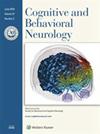海马体积数据在记忆障碍临床诊断中的应用
IF 1.7
4区 医学
Q4 BEHAVIORAL SCIENCES
引用次数: 2
摘要
背景:海马体积数据在研究中被广泛使用,但很少在临床人群中进行检查,以帮助诊断或与客观记忆测试分数相关。目的:复制和扩展先前为数不多的临床检查海马体积数据的实用性。我们评估了MRI体积数据,以确定(a)与认知完整组相比,诊断组的海马损失程度,(b)海马总体积或侧化体积是否预测诊断组成员,以及(c)总体积和侧化体积与记忆测试的相关性。方法:我们回顾性检查了294名被转诊到记忆诊所的患者的海马体积数据和记忆测试分数。结果:与认知完整的个体相比,轻度认知障碍或阿尔茨海默病患者的海马体积较小。原始和标准化的总海马体积和侧化海马体积在预测诊断组成员方面基本相等,显著的低海马体积显示出比灵敏度更高的特异性。所有体积数据都与记忆测试分数相关,诊断组的总海马体积和左海马体积的差异略大。结论:诊断组表现出海马体积损失,这可能是临床上神经退行性疾病的潜在生物标志物。然而,仅使用海马体积数据来预测诊断组成员或记忆测试失败是不受支持的。虽然在认知完整的组中,极端的海马体积损失是罕见的,但这些体积数据的敏感性表明,在进行诊断时,需要通过其他工具进行补充。本文章由计算机程序翻译,如有差异,请以英文原文为准。
Diagnostic Utility of Hippocampal Volumetric Data in a Memory Disorder Clinic Setting
Background: Hippocampal volumetric data are widely used in research but are rarely examined in clinical populations in regard to aiding diagnosis or correlating with objective memory test scores. Objective: To replicate and expand on the few prior clinical examinations of the utility of hippocampal volumetric data. We evaluated MRI volumetric data to determine (a) the degree of hippocampal loss across diagnostic groups compared with a cognitively intact group, (b) if total or lateralized hippocampal volumes predict diagnostic group membership, and (c) how total and lateralized volumes correlate with memory tests. Method: We retrospectively examined hippocampal volumetric data and memory test scores for 294 individuals referred to a memory clinic. Results: Individuals with mild cognitive impairment or Alzheimer disease had smaller hippocampal volumes compared with cognitively intact individuals. The raw and normalized total and lateralized hippocampal volumes were essentially equal for predicting diagnostic group membership, and notably low hippocampal volumes evidenced greater specificity than sensitivity. All of the volumetric data correlated with the memory test scores, with the total and left hippocampal volumes accounting for the slightly more variance in the diagnostic groups. Conclusion: The diagnostic groups exhibited hippocampal volume loss, which can be a potential biomarker for neurodegenerative disease in clinical practice. However, solely using hippocampal volumetric data to predict diagnostic group membership or memory test failure was not supported. While extreme hippocampal volume loss was rare in the cognitively intact group, the sensitivity of these volumetric data suggests a need for supplementation by other tools when making a diagnosis.
求助全文
通过发布文献求助,成功后即可免费获取论文全文。
去求助
来源期刊
CiteScore
2.40
自引率
7.10%
发文量
68
审稿时长
>12 weeks
期刊介绍:
Cognitive and Behavioral Neurology (CBN) is a forum for advances in the neurologic understanding and possible treatment of human disorders that affect thinking, learning, memory, communication, and behavior. As an incubator for innovations in these fields, CBN helps transform theory into practice. The journal serves clinical research, patient care, education, and professional advancement.
The journal welcomes contributions from neurology, cognitive neuroscience, neuropsychology, neuropsychiatry, and other relevant fields. The editors particularly encourage review articles (including reviews of clinical practice), experimental and observational case reports, instructional articles for interested students and professionals in other fields, and innovative articles that do not fit neatly into any category. Also welcome are therapeutic trials and other experimental and observational studies, brief reports, first-person accounts of neurologic experiences, position papers, hypotheses, opinion papers, commentaries, historical perspectives, and book reviews.

 求助内容:
求助内容: 应助结果提醒方式:
应助结果提醒方式:


